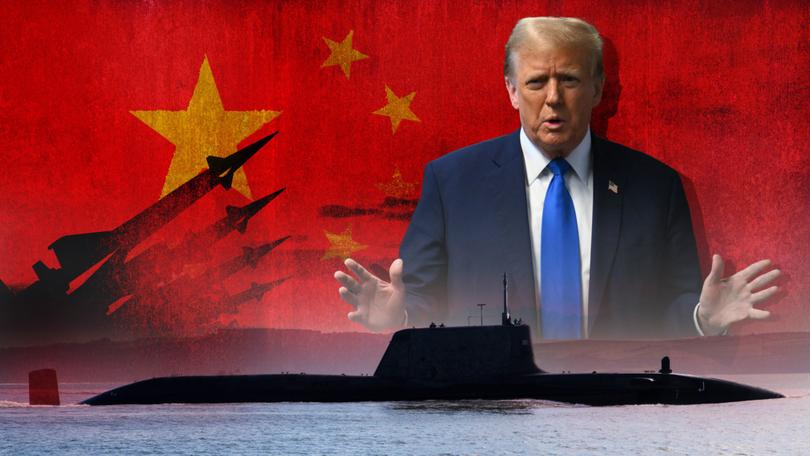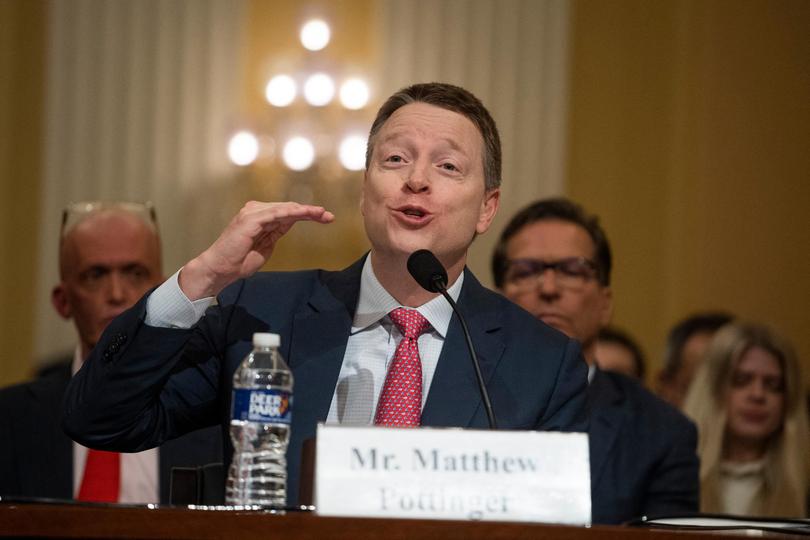Matthew Pottinger: Trump’s former security adviser says Aussie submarines will be crucial in deterring China
Australia’s submarines will be critical to the fight against any Chinese military takeover of Taiwan, Donald Trump’s former deputy national security adviser has said.

Australia’s submarines will be critical to the fight against any Chinese military takeover of Taiwan, Donald Trump’s former deputy national security adviser has said.
Chinese President Xi Jinping has said he wants to unify the democratic island with mainland China and will use force if necessary.
Speaking exclusively to The Nightly, Matthew Pottinger, whose new book The Boiling Moat sets out how to deter China from taking over Tawain, said Australia would be one of the most affected countries in the region if Xi Jinping were successful.
Sign up to The Nightly's newsletters.
Get the first look at the digital newspaper, curated daily stories and breaking headlines delivered to your inbox.
By continuing you agree to our Terms and Privacy Policy.“Deterring a war over Taiwan is of utmost importance right now and Australia has a key role to play in that,” Mr Pottinger said.
“Because the consequences of Taiwan being forcibly annexed will be as great, if not greater, for Australia as it will be for other countries around the world.”
Mr Pottinger said the best way to prevent Chinese aggression was to show Beijing that allies had not just the capability, but will to defeat any invasion.
“So submarines from the collective fleet of Japan, the United States, Australia — in particular — are going to be really important to that fight,” he said.
“And really important to deterring Beijing from undertaking such a reckless fight in the first place.”
Former prime minister and Ambassador to the US Kevin Rudd told an audience in Honolulu that Xi had around a decade left to achieve his stated goal of Chinese rejuvenation, which included claiming Taiwan.
This meant the West had around a decade to deter Xi from using military force, or methods that Rudd described as “short of war.”
That timing would roughly be around the same time Australia’s AUKUS submarines come online, should the mammoth acquisition project proceed according to schedule.
Justin Bassi, executive director of the Australian Strategic Policy Institute helped develop AUKUS policy during his time as chief of staff to then foreign minister Marise Payne.
“AUKUS is not about automatically joining any war,” he said.
“But neither is the AUKUS partnership and nuclear-powered submarines merely to protect sea lanes.
“AUKUS doesn’t reduce Australian sovereignty but strengthens it — as a nation we both retain our agency to make decisions while having access to the best technology and working with our most trusted security allies and partners.
“Coercion and aggression by an authoritarian adversary would be the real threat to our sovereignty, not close cooperation with trusted partners to uphold rules, norms, openness and security.”

A Chinese blockade of Taiwan, which produces the majority of the world’s chips that power everyday appliances and devices, would cause an immediate economic global shock valued at at least $US2 trillion, according to numbers crunched by Rhodium Group.
And the UK government has told China that if it moved on Taiwan, it would collapse China’s economy as well as many neighbouring ones.
James Cleverly said that when he was foreign secretary, he told the Chinese repeatedly that “conflict across the Taiwan Strait would collapse the Chinese economy and bring a number of other economies with it.”
China is Australia’s largest two-way trading partner and buys almost one-third of Australia’s exports, and Prime Minister Anthony Albanese has made it a priority to restore trade ties with Beijing that the CCP cut off under the former Coalition government when tensions reached a high.
China’s economic coercion preceded the former government’s decision to buy more powerful nuclear-powered submarines from the UK and US, instead of sticking with diesel-electric boats made in France.
Debate has raged in Australia about whether or not the nuclear-powered submarines being acquired from the United States and UK through AUKUS would be fielded in any skirmish over Taiwan.
US Deputy Secretary of State Kurt Campbell, who oversees AUKUS in the Biden Administration, recently said AUKUS has the potential for Australian submarines to deliver conventional fire from long distances in any cross-strait conflict.
“AUKUS has the potential to have submarines from a number of countries operating in close coordination that could deliver conventional ordnance from long distances,” Mr Campbell said.
“Those have enormous implications in a variety of scenarios, including in cross-strait circumstances.”
But this was contradicted by General Stephen Sklenka, the deputy commander of US Indo-Pacific Command, who on a recent visit to Canberra said there was “no expectation” of Australian involvement and said he had no idea if the government would be obliged to contribute.
However, he added that as a military figure, the decision was not for the military to decide but for governments.

